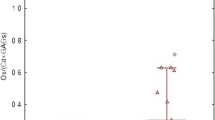Abstract
The role of ascorbic acid (ASC) in the pathophysiology of renal calcium stones is not clear. We evaluated ASC in blood and urine of fasting male patients with idiopathic calcium urolithiasis (ICU) and healthy volunteers. Using smaller subgroups, we also evaluated their response to exogenous ASC [either intravenous or oral ASC (5 mg/kg bodyweight)] administered together with an oxalate-free test meal. The influence of ASC on calcium oxalate crystallization, the morphology of crystals at urinary pH 5, 6 and 7, and the effect of increasing duration of urine incubation on urinary oxalate at these pHs, without and with addition of ASC, were studied too. In normo- and hypercalciuric ICU, blood and urinary ASC from fasting patients remained unchanged, but the slope of the regression line of urinary ASC versus urinary oxalate was steeper than in the controls; the plasma ASC half-life did not differ between controls, normo- and hypercalciuric ICU; the ASC-supplemented meal caused an increase in the integrated plasma oxalate in the normocalciuric subgroup versus controls. In normo- and hypercalciuric ICU urinary oxalate, the oxalate/glycolate ratio, and calcium oxalate supersaturation were increased, but urinary glycolate was unchanged. In the controls, oral ASC did not affect calcium oxalate crystallization, while in ICU, ASC inhibited crystal growth. In control urine calcium oxalate dihydrate and calcium oxalate monohydrate develops, while in ICU urine only the former crystal type develops. In vitro oxalate neoformation from ASC did not occur. It was concluded that (1) under normal conditions an abettor role of ASC for renal stones is not recognizable, (2) in ICU, urinary oxalate excess unrelated to degradation of exogenous ASC is exhibited, and that this is most likely unrelated to an initial increase in oxalate biosynthesis, and (3) ASC appears to modulate directly calcium oxalate crystallization in ICU, although the true mode of action is still not known.
Similar content being viewed by others
Author information
Authors and Affiliations
Additional information
Received: 24 September 1999 / Accepted: 16 December 1999
Rights and permissions
About this article
Cite this article
Schwille, P., Schmiedl, A., Herrmann, U. et al. Ascorbic acid in idiopathic recurrent calcium urolithiasis in humans – does it have an abettor role in oxalate, and calcium oxalate crystallization?. Urological Research 28, 167–177 (2000). https://doi.org/10.1007/s002400000101
Issue Date:
DOI: https://doi.org/10.1007/s002400000101




